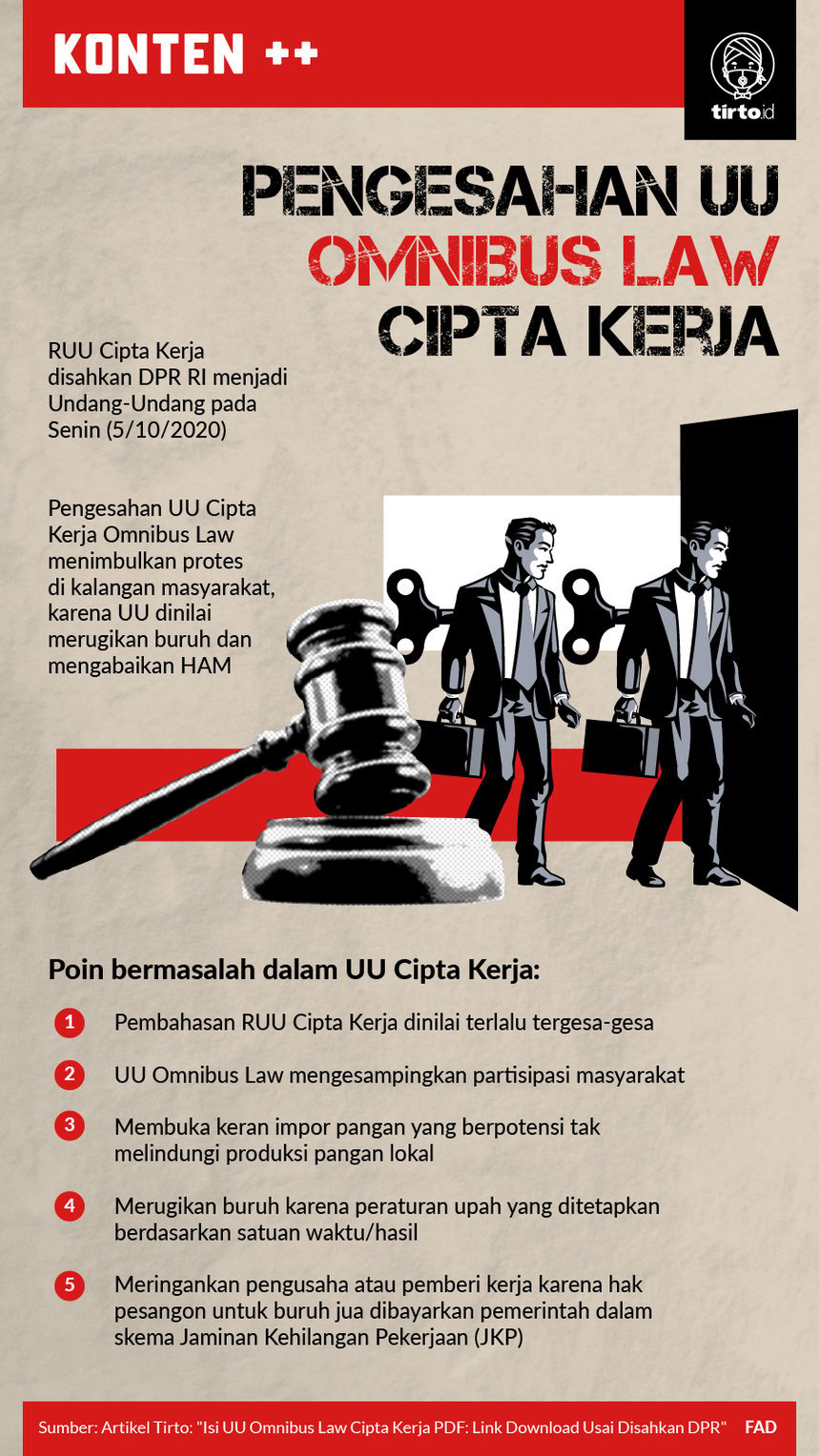:strip_icc():format(webp)/kly-media-production/medias/3258481/original/093203000_1601903291-20201005-Cipta-Kerja-7.jpg)
Omnibus Law telah menjadi kontroversi setahun belakangan ini. UU yang dikenal sebagai UU Cipta Kerja ini tiba-tiba saja disahkan pada hari Senin (5 Oktober) lalu, sehingga menimbulkan demo di berbagai wilayah Indonesia selama 2 hari belakangan. Lalu, apa sih sebenarnya Omnibus Law ini? Kenapa sih dikatakan Omnibus? Dari mana sih asal mulanya? Kenapa sih bisa merugikan buruh? Ikuti blog ini untuk lebih lengkapnya!
Artikel ini selanjutnya akan ditulis dalam bahasa Inggris. Kok gitu? Untuk meningkatkan kemampuan membaca kalian dalam bahasa Inggris, tentunya. Salah satunya yaa… lewat baca berita. Tipe bacaan ini juga dibahas loh dalam EOS ActiveRL, biar kalian gak kaget!

What is Omnibus?
Before we talk about anything else, let’s talk about the origin of Omnibus. In the legal context, according to the Merriam-Webster, omnibus comes from a Latin word omnibus that means “for all.” Omnibus, however, is the dative plural of omnis, which means “all” in Latin. Sounds a bit like an omnivore, a living creature that eats both flesh and plants, right?
Then, this word came into French. Back then, it meant “long, horse-drawn vehicles that transported people along the main thoroughfares of Paris,” before becoming English.
Just for your information, the “omnibus bill” was the equivalence for “a bus loaded with people.” This is because the bill contains numerous provisions. In the end of the day, Omnibus Law is understood as “the rule of the rules,” in which more than one aspects are conjoined to become a legislation.
The Start of Omnibus Law
Many of you guys then asked, how did the Omnibus Law start? Because of that reason, I’m going to cover the start of the Omnibus Law until becoming a legislation we know today.
During his second-term presidential inauguration on October 20, 2019, Jokowi proposed two legislations: UU Cipta Kerja (Job Creation Bill) & UU Pemberdayaan UMKM (SME Empowerment Bill). In his speech, he told the public that these bills will not only revise several bills, but also dozens of bills. He hoped to simplify the rules in quantity and in terms of the ruling so it will be on target.
There are 11 sectors that are covered by the Omnibus Law, such as:
- The simplification of land permits (penyederhanaan perizinan tanah)
- Investment criteria (persyaratan investasi)
- Employment (ketenagakerjaan)
- The ease and the protection of SMEs (kemudahan dan perlindungan UMKM)
- The ease to start a business (kemudahan berusaha)
- The support to do research and innovation (dukungan riset dan investasi)
- Governmental administration (administrasi pemerintahan)
- Sanction-imposing (pengenaan sanksi)
- Land-controlling (pengendalian lahan)
- The ease of governmental projects (kemudahan proyek pemerintah)
- Special Economic Zone (Kawasan Ekonomi Khusus/KEK)
Additionally, these 6 sectors regarding taxation are covered:
- Investment funding (pendanaan investasi)
- Territorial system (sistem teritori)
- Individual taxpayer (subjek pajak orang pribadi)
- Taxpayer compliance (kepatuhan wajib pajak)
- Business climate fairness (keadilan iklim berusaha)
- Facilities (fasilitas)
The Debacle Between the Government and the People
Those discussions above cause a debacle within the people. Especially, the Job Creation discussion of the Omnibus Law looked done in haste in the House of Representatives without involving the people. How could it be? Isn’t the House represent us the people? Here’s the explanation.
If we refer to the House of Representatives’ official website, the House has the power to create legislation. A legislation can firstly come from the President, the Regional Representative Council (DPD) regarding the regional autonomy, or the House itself, which will be sorted in a National Legislation Program (Prolegnas). Then, the draft that has been agreed within the House and the President will be promulgated as a legislation.
Unfortunately, this is not the case with the Omnibus Law. In comparison to the previous legislation, the people felt the discussion inside the government has been conducted in haste despite the pandemic. For example, the mayor of Bogor, Bima Arya, criticized the discussion process was in a hurry on why it has to be targeted to be done in 100 days. He stressed several crucial points that need to be discussed openly with the people and the regional government to ensure transparency, more participation, and inclusion.

Those points raised by the people are mostly within the export-import and the employment sector, which they deem harmful. Summarized by Kompas, supported by Tirto in the aforementioned infographic, those are:
- The abolition of the citywide minimum wage (Upah Minimum Kota/Kabupaten or UMK), replaced by the province-wide minimum wage (Upah Minimum Provinsi or UMR).
- Increased overtime hours, from a maximum of 3 hours to 4 hours daily, and from a maximum of 14 hours to 18 hours weekly.
- Lifetime contract and vulnerability to work termination.
- The reduction of time-off, from only one day per six working days, and the abolishment of the two months per six months’ sabbatical.
- The ease of foreign workers’ recruitment.

Aftermath
Since the Omnibus Law first discussed, it received backlash against the House in form of various demonstrations. One notable demonstration was from March 2020, when the workers’ union demonstrated against the Omnibus Law draft. They demanded for the employment-related rulings to stick to the status quo on the Employment Act number 13/2003 over the above reasons. The chief of the Indonesian Trade Union Confederation, Said Iqbal, said that Jokowi’s intention to attract foreign investments to create a working field doesn’t mean the government has to sacrifice the workers’ rights.
As a result, according to the Secretary of the Coordinating Ministry for Economic Affairs, Susiwijono, every economical stakeholder would be involved in the discussion, as ordered by the President. He continued that a roadshow would be held to accommodate people’s aspirations in the law’s creation. On the contrary, according to the member of Gerakan untuk Indonesia Adil dan Demokratis (Movement for Fair and Democratic Indonesia/GIAD), Jeirry Sumampow, the government should have postponed the Omnibus Law discussion in the midst of the Covid-19 pandemic.
During the process, Covid-19 strikes the world (causing lockdown in various countries ranging from the Netherlands to Canada) and Indonesia is also affected. With people questioning how the Indonesian government handled the coronavirus, they came up with the hashtag Atasi Virus Cabut Omnibus (Overcome the Virus, Repeal the Omnibus) to demand the government to solve the never-ending first wave of coronavirus in Indonesia.
The String of Demonstrations
Within seven months, the string of demonstrations continue, with the most notable coming within October 6-8, 2020 – the days when the House scheduled to meet over Omnibus Law. Suddenly, the House fast-forwarded the discussions to October 5, 2020, and officially promulgated the law, resulting in demonstrations in 18 provinces, which mostly ended up violently. Only two political parties opposed this law, which is the Democratic Party (Partai Demokrat) and the Prosperous Justice Party (PKS).
Several days after most demonstrations, Dradjad H. Wibowo, an INDEF economist, admitted that the House of Representatives passed an incomplete draft. One main reason is because the team in charge of formulating the law hasn’t yet to finish the draft. According to the constitutional law expert, Faiz Rahman of Gadjah Mada University (UGM), it was strange that the lawmakers had claimed not to receive a draft during the plenary session–because each member should’ve been given and read the final draft before passed into law. This caused another uproar from the people continuing the protest until the Omnibus Law is repealed.
Vocab Corner
The vocabulary is listed in alphabetical order of the English words/phrases used in this reading.
| WORD/PHRASE | INDONESIAN TRANSLATION |
| abolition | penghapusan |
| backlash | pertentangan |
| conjoined | dijadikan satu |
| Coordinating Ministry for Economic Affairs | Menteri Koordinator Bidang Perekonomian |
| Debacle | Pergolakan |
| Employment Act | UU Ketenagakerjaan |
| House of Representatives | Dewan Perwakilan Rakyat (DPR) |
| Indonesian Trade Union Confederation | Konfederasi Serikat Pekerja Indonesia (KSPI) |
| in haste | secara terburu-buru |
| legislation | Undang-Undang (UU) |
| lifetime | seumur hidup |
| National Legislation Program | Program Legislasi Nasional (Prolegnas) |
| overtime | lembur |
| plenary session | persidangan |
| Presidential inauguration | pelantikan Presiden |
| raised | diangkat |
| Regional government | Pemerintah daerah |
| Regional Representative Council | Dewan Perwakilan Daerah (DPD) |
| repeal | mencabut |
| sabbatical | cuti panjang |
| stick to the status quo | tetap di keadaan sekarang |
| time-off | waktu istirahat |
| uproar | kegemparan |
| workers’ union | serikat buruh |
| Work termination | Pemutusan Hubungan Kerja (PHK) |
Stay tuned for our next blog post talking about the vocabulary used when talking about Omnibus Law!
Quiz
- There are two words that can be able to describe “mengesahkan (hukum).” What are the words?
- These are the tax-related sectors covered in the Omnibus Law, except:
- Territorial system
- Individual taxpayer
- Sanction-imposing
- Taxpayer compliance
- What happened after the string of demonstrations happened within October 6-8, 2020?


